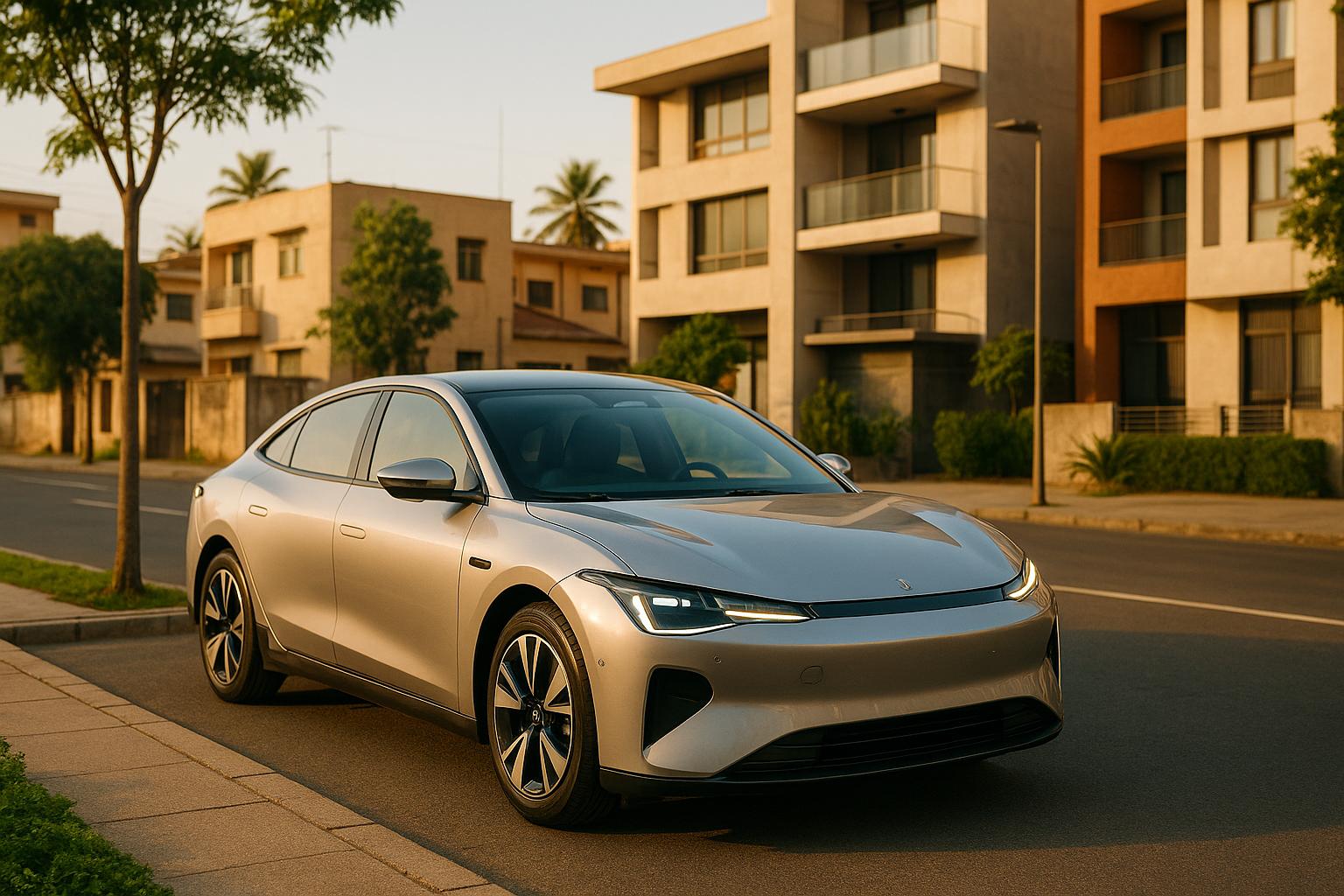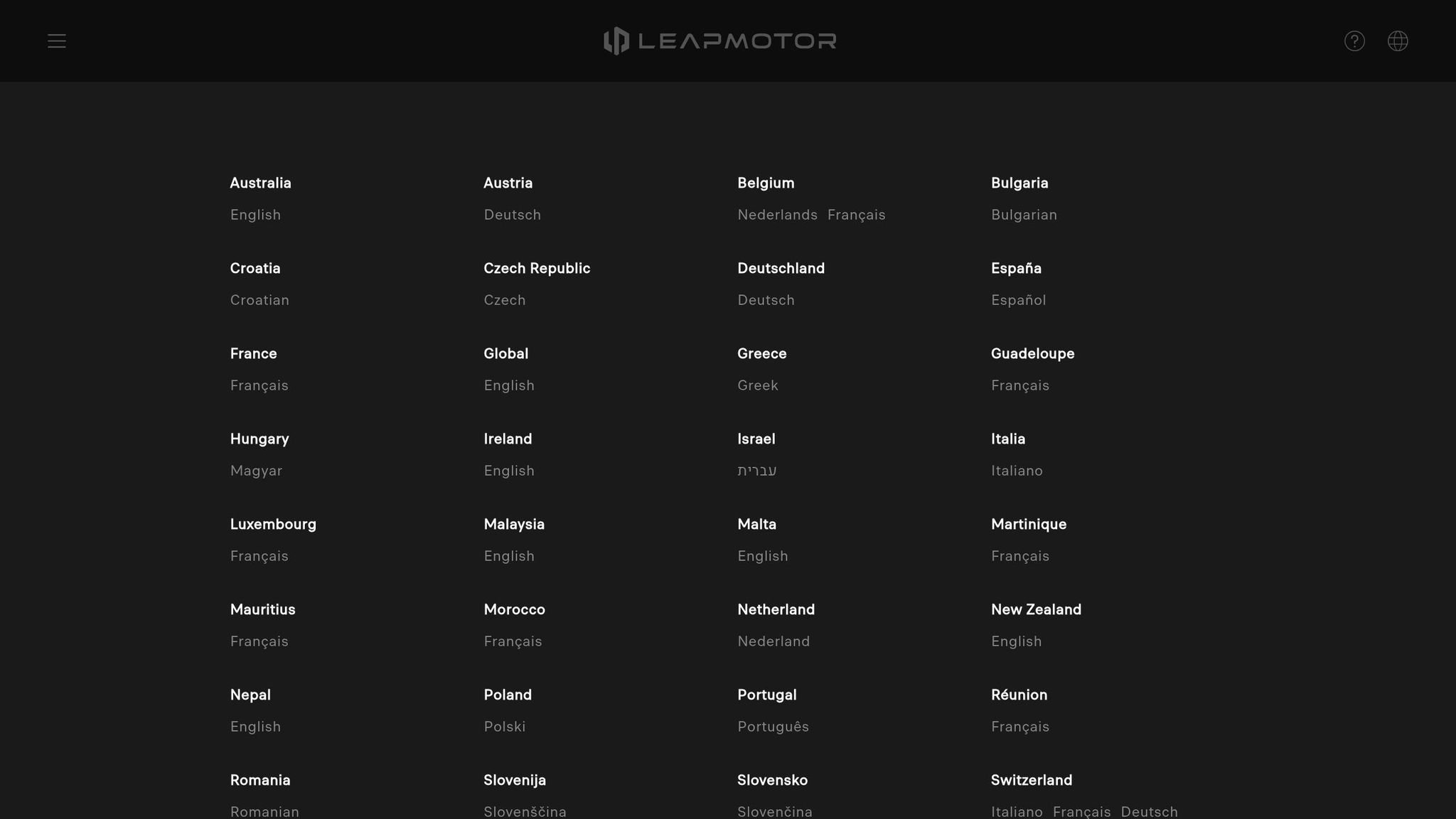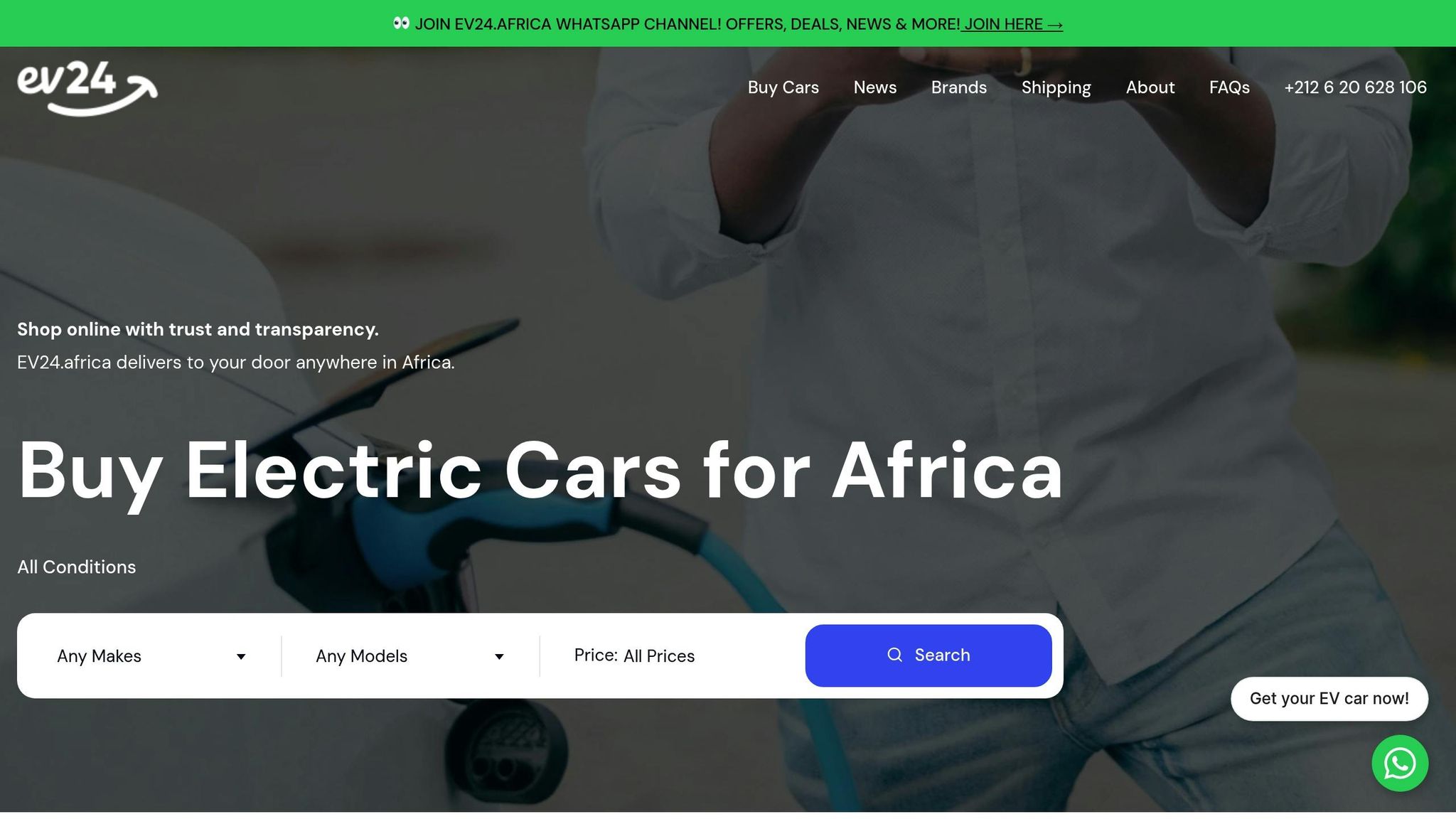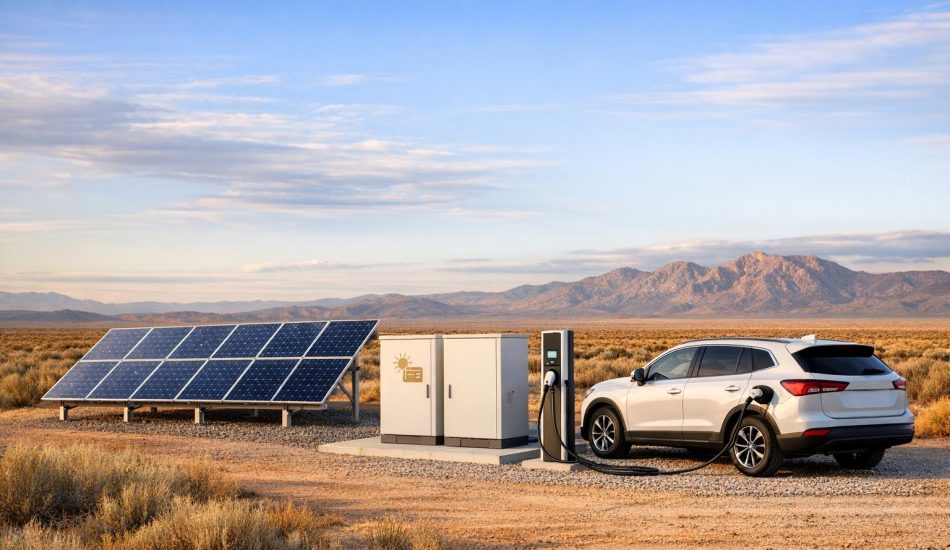
Leapmotor, a growing player in the global EV market, has entered Nigeria with three models: the T03 city car, C10 mid-size SUV, and B10 compact SUV. These vehicles offer competitive pricing, advanced features, and varying ranges to cater to different needs. Here’s what you need to know:
- T03: A compact city car priced at ₦31,978,500 (~$21,600 USD), offering a 41.3 kWh battery with a 280 km (174 miles) range.
- C10: A mid-size SUV at ₦69,245,900 (~$46,700 USD), featuring a 69.9 kWh battery, a 420 km (261 miles) range, and high safety standards.
- B10: A premium compact SUV with a 67.1 kWh battery and a 600 km (373 miles) range, available for import starting at $18,571 USD.
While EV adoption in Nigeria is growing, challenges like high import costs, limited charging infrastructure, and currency fluctuations impact pricing. However, government incentives, financing options from platforms like EV24.africa, and the push for local EV production aim to improve affordability and accessibility.
Quick Comparison:
| Model | Price in Nigeria | Battery Capacity | Range (km) | Key Features |
|---|---|---|---|---|
| T03 | ₦31,978,500 (~$21,600) | 41.3 kWh | 280 | Compact, affordable, city-focused |
| C10 | ₦69,245,900 (~$46,700) | 69.9 kWh | 420 | Family-friendly, 5-star safety rating |
| B10 | $18,571 USD (import) | 67.1 kWh | 600 | Advanced tech, premium features, long range |
Leapmotor’s entry aligns with Nigeria’s EV growth, driven by government initiatives and demand for cost-effective, efficient vehicles. While challenges remain, the market is set to expand, making Leapmotor an option worth considering.
Leapmotor EV Models Available in Nigeria

Complete Model Lineup
Leapmotor offers three electric vehicle models in Nigeria, each catering to different needs: the T03 city car (available in 70 kW and 80 kW options), the C10 mid-size SUV designed for families, and the B10 compact SUV, which debuted in April 2025. Let’s break down what makes each model stand out for Nigerian EV enthusiasts.
Key Features of Each Model
Leapmotor T03
This compact city car is ideal for urban commuting. It comes equipped with a 41.3 kWh battery, delivering a range of 280 km (174 miles) and a top speed of 130 km/h (81 mph).
Leapmotor C10
A mid-size SUV featuring a 160 kW motor paired with a 69.9 kWh battery. It offers an impressive range of 420 km (261 miles), a top speed of 170 km/h (106 mph), and boasts a 5-star Euro NCAP safety rating. It also supports DC fast charging at speeds of up to 84 kW.
Leapmotor B10
The most advanced option in the lineup, the B10 is powered by a 160 kW motor and a 67.1 kWh battery, offering a remarkable range of 600 km (373 miles). It’s packed with modern features like an L2 Advanced Driving Assistance System, a 14.6-inch touchscreen, and wireless charging capabilities.
These unique features define the performance and appeal of each model, ensuring there’s an option for every type of driver.
| Model | Type | Engine | Max Speed | Battery | Range | Key Highlight |
|---|---|---|---|---|---|---|
| T03 (70 kW/80 kW) | City Car | 70 kW / 80 kW | 130 km/h (81 mph) | 41.3 kWh | 280 km (174 miles) | Affordable and compact for city driving |
| C10 | Mid-Size SUV | 160 kW | 170 km/h (106 mph) | 69.9 kWh | 420 km (261 miles) | High safety standards and family-friendly |
| B10 | Compact SUV | 160 kW | 170 km/h (106 mph) | 67.1 kWh | 600 km (373 miles) | Advanced tech with L2 autonomous driving |
Each model is designed to meet the growing demand for reliable and efficient EVs in Nigeria, whether for daily urban travel or family adventures.
Model Availability in Nigeria
Leapmotor’s lineup is competitively priced to appeal to the Nigerian market. The C10 is available at ₦69,245,900 (approximately $46,700 USD), while the T03 70 kW is priced at ₦31,978,500 (around $21,600 USD). The B10, though currently available only for import, has an international MSRP of $18,571 USD.
To simplify the ownership process, EV24.africa assists with importing all Leapmotor models. They handle logistics, financing options, and after-sales services, ensuring seamless access to the full lineup for Nigerian customers.
Leapmotor EV Prices in Nigeria: 2025 Update
Current Price Ranges by Model
Leapmotor vehicles in Nigeria come with a premium price tag due to import-related costs, making them significantly more expensive than their original Chinese export prices. For instance, the Leapmotor C10 is currently priced at ₦69,245,900 (about $46,700), while the Leapmotor T03 70kW is available for ₦31,978,500 (roughly $21,600).
To put this in perspective, the T03’s export price from China starts at $10,001, with an Ex Works total of $10,886 after additional fees. This means Nigerian buyers are paying nearly double the base price. Meanwhile, the Leapmotor B10 compact SUV and the T03 80kW variant currently lack fixed pricing in Nigeria. Buyers interested in these models need to request individualized quotes, which depend on current exchange rates and shipping costs.
These price disparities underscore the need to understand the key factors influencing Leapmotor’s pricing in the Nigerian market.
What Affects Leapmotor Pricing
Several factors contribute to the higher pricing of Leapmotor vehicles in Nigeria, including import duties, currency fluctuations, shipping expenses, and dealer margins. Among these, import duties and taxes make up the largest portion of additional costs.
In a significant policy decision on September 17, 2025, Nigeria suspended a 4% tax on the Free on Board (FOB) value of imported goods. This tax had been reinstated just a month earlier, in August 2025. Explaining the decision, Finance Minister Wale Edun stated:
"Following extensive consultations with industry stakeholders, trade experts, and relevant government officials, it has become clear that the implementation of the 4% FOB charge poses significant challenges to Nigerian trade facilitation, the business environment, and economic stability."
Another critical factor is the volatility of the Nigerian naira against the U.S. dollar. With an inflation rate of 20.12% as of August 2025, these currency fluctuations have a direct impact on vehicle prices. For buyers in Nigeria, navigating these cost challenges is essential to balance affordability with the desire for advanced EV technology. This is where the financing options provided by EV24.africa become particularly important.
Financing Options with EV24.africa

EV24.africa offers financing solutions tailored to make electric vehicle ownership more accessible. Their auto loans come with a competitive 9% APR and flexible terms ranging from 12 to 60 months, depending on the buyer’s credit profile and down payment. The platform’s digital pre-approval process ensures loan decisions are made quickly – typically within 24 hours.
For those interested in environmentally friendly purchases, green financing options are available. These often feature reduced interest rates and more adaptable repayment terms. EV24.africa collaborates with local Nigerian banks to design loan products specifically for electric vehicle buyers.
Businesses looking to invest in EV fleets can benefit from corporate and fleet financing options. These include volume discounts, extended repayment terms, lease-to-own programs, and partial payment plans during the ordering process. To simplify the process, EV24.africa provides a loan calculator that estimates monthly payments based on loan terms, down payments, and interest rates. All financing and processing fees are transparently displayed, helping buyers make informed decisions.
Specifications and Features Comparison
Technical Specifications Across Models
The Leapmotor C10 takes the lead as the flagship model for Nigerian buyers, offering a solid mix of performance and practicality. This mid-sized SUV is powered by a 69.9 kWh Lithium Iron Phosphate (LFP) battery, providing a WLTP-certified range of 420 km (261 miles). In real-world conditions, you can expect a range between 320–350 km (200–217 miles).
On the performance side, the C10 delivers 160 kW (218 hp) and 320 Nm of torque through a rear-wheel-drive system. It sprints from 0–100 km/h (0–60 mph) in 7.5 seconds and maxes out at a top speed of 170 km/h (106 mph). Charging options include DC fast charging up to 84 kW, taking the battery from 30% to 80% in about 30–44 minutes, and AC charging at 6.6 kW, with an optional upgrade to 11.0 kW.
For those seeking a more affordable option, the Leapmotor T03 offers a 37.3 kWh battery with a WLTP range of 265 km (165 miles). While specific power output numbers aren’t disclosed, this model is designed with urban efficiency and budget-friendliness in mind.
Interior and Technology Features
When it comes to interior space and technology, the Leapmotor C10 stands out with thoughtful design and useful features. The rear seats can recline and even convert into a bed for added comfort. Storage is plentiful, with 435 liters (15.4 cu ft) of boot space that expands to 1,410 liters (49.8 cu ft) when the seats are folded, plus a 32-liter (1.1 cu ft) front trunk (frunk) in the BEV version.
Tech highlights include a 14.6-inch touchscreen and a 10.25-inch digital cluster powered by Qualcomm. The system supports wireless phone charging, a 12-speaker audio setup, and Over-the-Air (OTA) updates. However, it lacks Apple CarPlay and Android Auto, which may be a drawback for some users.
Safety is another strong point for the C10, which boasts a 5-star Euro NCAP rating. Advanced Driver Assistance Systems (ADAS) include features like Autonomous Emergency Braking (AEB), Adaptive Cruise Control, Lane Keeping Assist, and a 360-degree camera system. Additionally, the C10 supports Vehicle-to-Load (V2L) functionality, allowing users to power external devices with up to 3.3 kW AC.
Not all feedback has been glowing, though. As Vicky from Electrifying.com pointed out:
"I wasn’t blown away by the interior quality, and I just couldn’t live with the driver assist systems. They were unforgivably intrusive, and not easy enough to switch on- and off- as might be appropriate depending on the roads you’re on."
- Vicky, Reviewer, Electrifying.com
The Leapmotor T03, while simpler, offers practical features suited for city driving. Meanwhile, the B10 promises premium amenities like GPS navigation, heated and cooled seats, a heated steering wheel, keyless entry, multi-zone climate control, and L2 assisted driving with 360-degree cameras.
Model Comparison Table
| Specification | Leapmotor T03 | Leapmotor C10 BEV | Leapmotor B10 |
|---|---|---|---|
| Body Type | Compact City Car | Mid‑sized SUV | C‑SUV |
| Battery Capacity | 37.3 kWh | 69.9 kWh (usable) | 56.2 kWh / 67.1 kWh |
| Range | 265 km (165 miles) WLTP | 420 km (261 miles) WLTP | 510 km / 600 km CLTC |
| Real‑World Range | – | 320–350 km (200–217 miles) | – |
| Power Output | – | 160 kW (218 hp) | 132 kW (180 hp) / 160 kW (218 hp) |
| Torque | – | 320 Nm (236 lb‑ft) | 175 Nm / 240 Nm |
| 0–100 km/h Acceleration | – | 7.5 seconds | – |
| Top Speed | – | 170 km/h (106 mph) | 160 km/h / 170 km/h |
| DC Fast Charging | – | 84 kW (30–80% in 30–44 min) | Fast charging available |
| AC Charging | – | 6.6 kW (11.0 kW optional) | – |
| Boot Space (seats up) | – | 435 liters (15.4 cu ft) | – |
| Boot Space (seats down) | – | 1,410 liters (49.8 cu ft) | – |
| Frunk | – | 32 liters (1.1 cu ft) | – |
| Safety Rating | – | 5‑star Euro NCAP | L2 ADAS, 360‑degree camera |
| Key Features | Basic city car amenities | 14.6″ touchscreen, panoramic sunroof, V2L, wireless charging | Heated/cooled seats, keyless entry, multi‑zone climate control |
| V2L Support | – | Yes, 3.3 kW AC | – |
| Smartphone Integration | – | No Apple CarPlay/Android Auto | – |
| Availability in Nigeria | Available | Available | Expected late 2025 |
This comparison highlights the C10 as a versatile choice for Nigerian drivers, blending range, safety, and practical features. The T03 is ideal for budget-conscious urban users, while the B10 is designed to offer greater range and premium features for those willing to wait until late 2025.
Leapmotor T03: The New King Of CHEAP EVs?
sbb-itb-99e19e3
How Leapmotor EVs Perform for Nigerian Buyers
Let’s take a closer look at how Leapmotor EVs handle the unique challenges of Nigerian roads, climate, and infrastructure.
Performance on Nigerian Roads and Climate
Nigerian roads can be tough on any vehicle. Models like the Toyota Land Cruiser and Hilux thrive in off-road conditions thanks to their high ground clearance and four-wheel-drive capabilities. Leapmotor EVs, however, are built with urban driving in mind. They’re ideal for city commutes but aren’t designed for rugged terrains.
The country’s climate also poses challenges. With temperatures often soaring past 95°F (35°C), battery cooling systems in EVs have to work overtime. This can sometimes lead to reduced driving range in real-world conditions.
Charging Infrastructure and Maintenance
Nigeria’s EV charging network is still in its early stages, with just 180 charging stations – 30 of which are fast-charging – mostly located in urban hubs like Lagos and Abuja. As Philip Sunday from Modibbo Adama University of Technology points out:
"Nigeria’s electric vehicle charging infrastructure is still in its infancy, with only 180 charging stations, including 30 fast charging points, predominantly located in urban areas."
For those living outside major cities, finding a fast-charging station can be a challenge. Ken Caldeira from Energy for Growth Hub highlights the issue:
"Public EV charging infrastructure is essentially nonexistent in Nigeria, and there is currently no defined roadmap for its future development."
Given the unreliable national grid, home charging becomes essential. Many EV owners rely on solar systems or backup generators to keep their vehicles charged.
On the upside, EVs require less maintenance than traditional petrol-powered cars. Nigerian EV owners typically spend ₦70,000 to ₦80,000 annually on maintenance – 30–50% less than what it costs to maintain petrol vehicles. However, finding qualified technicians can be tricky, as there are only a handful of certified EV service centers, such as those operated by Stallion Motors and SAGLEV. The government plans to train 2,000 youths in EV maintenance starting in September 2025, and companies like TotalEnergies and Qoray have announced plans to open new EV service centers in Lagos and Abuja by July 2025.
Ownership Costs and Savings
Owning an EV in Nigeria can lead to significant savings, especially when it comes to fueling costs. EV owners can cut monthly fueling expenses by up to 70% compared to petrol vehicles. With electricity prices at charging stations ranging from ₦90 to ₦150 per kWh, charging an EV is far cheaper than refueling with petrol.
Annual maintenance costs for EVs typically fall between ₦50,000 and ₦100,000, covering routine diagnostics and upkeep. Here’s a breakdown of common service intervals and costs:
| Service Interval | Tasks Included | Estimated Cost |
|---|---|---|
| Monthly (≈5,000–6,200 miles) | Tire rotation, battery inspection, charging port cleaning | ₦5,000–₦10,000 |
| Annually (≈11,200 miles) | Battery diagnostic, brake inspection, software updates, filter replacement | ₦20,000–₦40,000 |
| Every 2 Years (≈18,600–31,000 miles) | Coolant service, suspension check, AC service | ₦50,000–₦80,000 |
Leapmotor EVs also feature regenerative braking systems, which reduce brake pad wear and lower servicing costs. However, the added weight of EVs can lead to faster tire wear, with replacements costing ₦50,000 to ₦150,000 per tire every 2–3 years. Battery replacements, while rare, are expensive, ranging from ₦5 million to ₦12 million. Proper care – like parking in shaded areas and limiting fast charging – can extend battery life to 8–10 years.
Despite these challenges, Nigeria’s EV ecosystem is growing. By early 2025, there were approximately 15,000 to 20,000 EVs on Nigerian roads, making up 0.5% to 1% of the total vehicle population. With an annual growth rate of 6.8% projected through 2031, infrastructure and service availability are steadily improving. This, combined with the cost savings and technical advantages of Leapmotor EVs, makes them an appealing option for Nigerian drivers.
Leapmotor EV Trends in Nigeria Through 2025
Nigeria’s electric vehicle (EV) market is picking up speed, and Leapmotor is in a prime position to ride this wave of growth through 2025 and beyond.
New Models and Updates on the Horizon
Although Leapmotor hasn’t officially announced any launches in Nigeria, the market’s momentum suggests opportunities are just around the corner. The Nigerian government’s ambitious goal of achieving 7.5% EV adoption by the end of 2025 sets the stage for international brands like Leapmotor to establish a foothold.
Efforts to bolster local EV manufacturing are gaining traction. For example, by March 2025, Spiro plans to open its first assembly plant in Ogun State, aiming to produce 100,000 electric bikes and three-wheelers annually, along with locally manufactured battery packs. This kind of infrastructure development could pave the way for larger players like Leapmotor to set up operations in Nigeria, potentially reducing costs and increasing accessibility for consumers.
These developments align with Nigeria’s broader push toward EV adoption and market growth.
Market Growth and Pricing Dynamics
Nigeria’s EV market is expected to grow at a compound annual growth rate (CAGR) of 6.8% between 2025 and 2031. This steady growth signals rising demand, which could make Leapmotor EVs more affordable and accessible.
In 2024, electric car sales across Africa nearly doubled, reaching 11,000 units. This surge highlights the growing interest in EVs across the continent. Additionally, Nigeria’s government has set a target for 30% of all EVs sold in the country to be locally produced by 2032. Local production could significantly lower prices by cutting out import duties and transportation costs, making Leapmotor vehicles more appealing to Nigerian buyers.
"While countries like Kenya and Rwanda have made headlines for electric motorbike adoption, Nigeria’s size, urban density, and manufacturing base give it unique advantages. Foreign automakers seem to be betting on that."
– Ayodele Alabi
Adding to the long-term potential, Nigeria’s abundant lithium deposits could lead to cheaper battery production. This would further drive down costs for all EVs, including Leapmotor models.
How EV24.africa Supports Leapmotor Buyers
As Nigeria’s EV market evolves, platforms like EV24.africa are stepping up to make Leapmotor ownership smoother. Beyond offering flexible financing options, EV24.africa provides detailed vehicle listings, transparent pricing, and a range of services tailored to the growing demand for EVs in Nigeria.
Government and institutional backing is also playing a crucial role in accelerating EV adoption. Edna Joseph from Brifers highlights this support:
"The president of African Development Bank, DR Akinwunmi Adesina and the Federal Government of Nigeria… have shown strong commitment to supporting the EV revolution. This backing means real opportunities for investment, infrastructure, and policy frameworks that make EV adoption easier and faster."
This support creates a favorable environment for platforms like EV24.africa to expand their reach. The National Automotive Design and Development Council’s endorsement underscores how EVs are becoming a key part of Nigeria’s development agenda. These advancements in policy and infrastructure are making EV ownership more practical for everyday Nigerians.
EV24.africa’s ability to deliver vehicles to all 54 African countries further strengthens its position in Nigeria’s growing EV market. As charging networks expand and service centers become more widespread, the platform is poised to offer even more robust support to Leapmotor buyers.
"This is more than just a car launch. It’s a marker of intent. It shows that global EV manufacturers are starting to see Nigeria not just as a market to sell into, but a country to build with."
– Michaela Abor Adebola, Energy Mobility Analyst
With local partnerships and infrastructure improvements, Leapmotor ownership is becoming a more accessible reality. EV24.africa is well-positioned to connect buyers with these opportunities and provide ongoing support as the market continues to grow.
Conclusion
Leapmotor presents an exciting option for Nigerian EV buyers as the brand makes its way into the local market. Known as one of China’s fastest-growing EV companies, Leapmotor combines proven technology with competitive pricing, aligning perfectly with Nigeria’s shifting automotive needs.
The versatility of its flagship model further underscores its potential. The C10 model, available in both an all-electric version and a REEV Ultra Hybrid option, offers flexibility for buyers who may be concerned about charging infrastructure. While professional reviews have been mixed, many drivers have shared positive feedback about the driving experience, even as concerns beyond pricing persist.
Leapmotor’s appeal is amplified by its lower ownership costs and the momentum of Nigeria’s growing EV market, supported by the government’s ambitious goal of achieving 30% local EV production by 2032. With Nigeria’s electric vehicle market expected to grow at an annual rate of 6.8% through 2031, early adopters could gain significant advantages as the country transitions to cleaner, more sustainable mobility.
Leapmotor’s global expansion strategy adds another layer of promise. The brand aims to achieve 1 million sales worldwide by 2026, with 60% of those sales coming from international markets, positioning it as a strong contender in Africa. As energy expert Uzim Emmanuel aptly puts it:
"Nigeria has the potential to become Africa’s ‘Motor Valley’".
To support Nigerian buyers, platforms like EV24.africa provide financing options and support services, making Leapmotor ownership more accessible. As Nigeria works toward its long-term goal of full EV adoption by 2060, Leapmotor’s combination of affordability, advanced technology, and global reach makes it a brand to watch in the country’s rapidly growing EV market.
FAQs
What challenges does Leapmotor face in growing its electric vehicle market in Nigeria, and how is it addressing them?
Leapmotor is navigating several hurdles as it works to grow its electric vehicle (EV) presence in Nigeria. Among the biggest challenges are limited charging infrastructure, an unreliable electricity grid, the high cost of EVs, and low public awareness about electric vehicles. These obstacles create barriers for many potential buyers who might otherwise consider making the switch to EVs.
To tackle these problems, Leapmotor is taking proactive steps. The company is investing in the development of charging stations to improve accessibility, while also running campaigns to inform and educate Nigerians about the advantages of driving electric. On top of that, they are rolling out more budget-friendly EV models tailored to the local market, aiming to make EV ownership a realistic and appealing option for drivers in Nigeria.
How does Nigeria’s charging infrastructure affect owning a Leapmotor EV?
The feasibility of owning a Leapmotor EV in Nigeria largely depends on the country’s still-developing charging infrastructure. At the moment, public charging stations are few and far between, leaving most EV owners to depend on home charging for their daily needs. While there are efforts underway to establish more stations in major urban areas, the current setup falls short of supporting hassle-free long-distance travel.
For now, Leapmotor EVs are best suited for individuals who have reliable home charging options or drive primarily within shorter ranges. As Nigeria continues to expand its EV infrastructure, the ease and practicality of owning an electric vehicle are likely to grow in the future.
What financing options does EV24.africa provide to help Nigerians afford Leapmotor EVs?
EV24.africa provides flexible payment options to help make Leapmotor EVs more attainable for buyers in Nigeria. These include installment plans and support for bank transfers, making the purchasing process more straightforward.
By prioritizing affordability and ease, EV24.africa ensures transparent pricing and offers logistical support. This approach helps buyers navigate financial hurdles, making it easier to experience the advantages of owning an electric vehicle.




